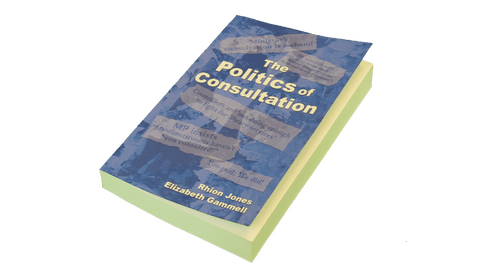The Politics of Consultation
Rhion Jones
Elizabeth Gammell 2018

Launched on July 12th 2018, at the Reform Club.
In July 2018, we published ‘The Politics of Consultation’, a work that drew extensively on the experience and insights of The Consultation Institute, which we started in 2003.
It told the tale of, mostly, well-meaning attempts to engage with people and civil society as public bodies and others sought to respond to demands for greater involvement and participation in decision-making. Politicians were caught in the middle of this, torn between enthusiastically supporting consultation – when it suited them, and nervous of its power to delay and divert them when rushing to make change happen.
It is not an academic study but is full of stories that will resonate with anyone interested in public policy at national or local levels and those who wish to see a healthy, inclusive, participative democracy.
The time is right for a proper discussion about the role of evidence in public policy-making at all levels from the parish pump to supra-national institutions. Twenty-four-hour news, social media, direct democracy and the desire for instant gratification have all led to a dumbing down of debate. This book asserts the role that public consultation can have in safeguarding standards in this difficult area, but argues that massive improvements are needed if this is to be achieved.
CLICK HERE to view the detailed contents
Also still relevant

By Rhion Jones & Elizabeth Gammell (Paperback)
A unique book, essential to those involved with consultations. Over ten thousand public servants in the UK and many others in the private and voluntary sectors engage in formal consultations, and it is time their efforts were celebrated, and their challenges properly addressed.
There’s a multi-million pound industry out there, currently asking us what we think. Lots of this is public money and much of it is wasted. Whilst a great deal of consultation is effective, some of it is downright dishonest; decision-makers have already made up their minds. If they then consult, it’s a waste of everyone’s time; they are just going through the motions. However, there is a positive future for the best in consultation, and this is an optimistic analysis. After all, only by engaging with people as customers or citizens, can some of our most intractable social and political problems be fixed.
That makes The Art of Consultation essential reading for everyone involved in these decisions. At the same time, this unique book is a practical guide to the effective implementation of consultation, and covers all the essential, up-to-date techniques to allow you to put in train consultations of the highest standard.